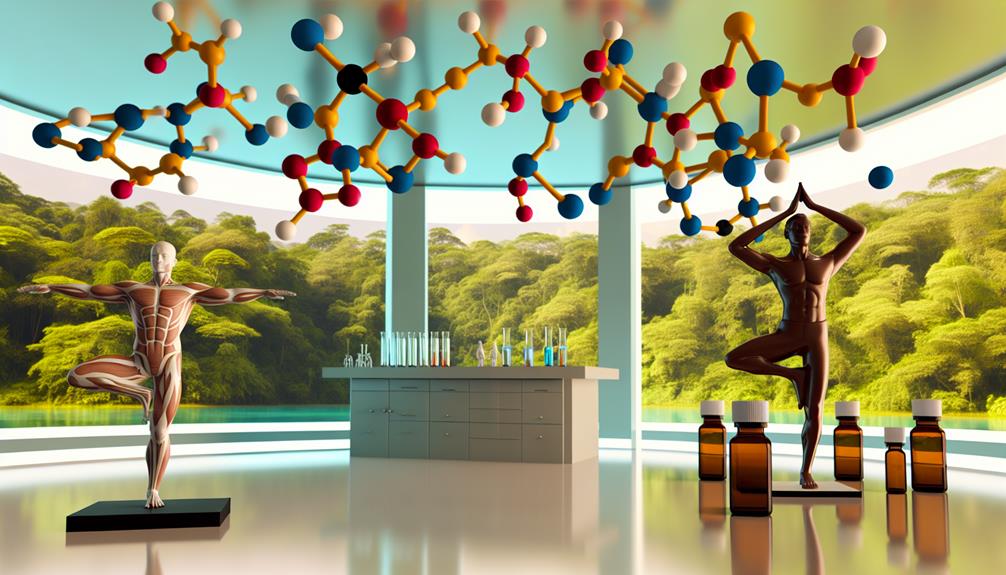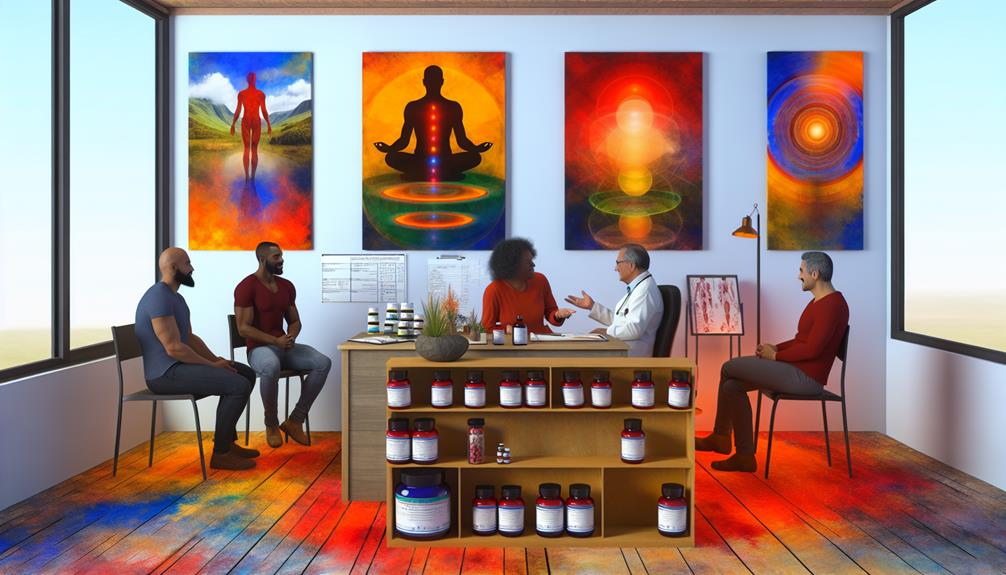Hormonal changes, especially testosterone fluctuations, greatly influence male libido and sexual performance. I've learned that testosterone levels naturally decline about 1% per year after age 30, impacting sexual desire and energy. Low testosterone can lead to fatigue, reduced libido, and diminished mood. Stress also plays a role, as elevated cortisol levels can hinder hormonal balance and decrease sexual interest. It's essential to evaluate lifestyle factors like diet, exercise, and sleep quality, as they affect hormonal health. Understanding these dynamics is key, and there's much more to explore regarding potential treatments and lifestyle modifications that can enhance sexual health.
Understanding Male Hormones

In understanding male hormones, it's essential to recognize their intricate roles in regulating libido and sexual performance. Male hormones, primarily androgens, undergo complex processes of hormone synthesis within the testes and adrenal glands. The primary androgen, testosterone, is synthesized from cholesterol through a series of enzymatic reactions. This synthesis is tightly regulated by various factors, including luteinizing hormone (LH) and follicle-stimulating hormone (FSH), which are secreted by the pituitary gland.
Once synthesized, these hormones exert their effects by binding to specific hormone receptors located throughout the body. These receptors, which include androgen receptors, are vital in mediating the actions of testosterone on target tissues, such as the brain, muscle, and reproductive organs. The binding process triggers a cascade of cellular responses that influence not only libido but also overall sexual function.
Moreover, the sensitivity and density of hormone receptors can greatly impact how effectively testosterone can exert its effects. For instance, lower receptor sensitivity may lead to diminished responses to normal testosterone levels, potentially resulting in reduced libido and performance issues. Understanding this interplay between hormone synthesis and receptor dynamics is essential for grasping how hormonal fluctuations can affect male sexual health.
Testosterone and Libido
Testosterone plays an important role in modulating libido, influencing sexual desire and motivation in men. I've observed that fluctuations in testosterone levels can lead to significant changes in libido, often impacting overall sexual function. The endocrine system, which regulates hormone production, is critical for maintaining ideal testosterone levels, and any disruption can result in diminished reproductive health.
As I explore the mechanisms of hormonal regulation, I find it fascinating how testosterone acts through hormone signaling pathways to affect not only sexual desire but also mood and energy levels. Low testosterone levels are often associated with decreased libido, prompting many to seek hormone therapies for enhancement. Testosterone replacement therapy has emerged as a viable option for those experiencing symptoms linked to low testosterone, such as reduced libido and fatigue.
However, it's important to approach this therapy cautiously. While it may offer libido enhancement, there can be side effects and risks involved that need careful consideration. Monitoring testosterone levels during treatment is essential to guarantee that the therapy effectively addresses libido fluctuations without compromising other aspects of health.
Impact of Age on Hormones

As men age, hormonal changes become increasingly pronounced, impacting both testosterone levels and overall sexual health. One of the most notable aspects of this is the phenomenon known as hormonal aging. I've observed that testosterone levels generally peak in early adulthood and subsequently experience an age-related decline. Research indicates that by the time a man reaches his 30s, testosterone production can decrease by approximately 1% per year.
This gradual reduction doesn't merely manifest as lower testosterone levels; it can also lead to various physiological and psychological effects. I've noticed that many men report changes in libido, energy levels, and even mood. The interplay between declining testosterone and other hormones, such as estrogen and cortisol, can further complicate the picture. As testosterone levels drop, there's often a relative increase in body fat and a decrease in lean muscle mass, which can exacerbate feelings of fatigue and reduce overall energy.
It's essential to understand that these hormonal shifts are not uniform; variability exists among individuals. Factors such as genetics, lifestyle choices, and underlying health conditions can influence the degree of hormonal aging experienced. For some, this decline may be minimal, while for others, it could greatly impact their quality of life. Recognizing these changes and understanding their implications is important for steering through the complexities of male sexual health as we age.
Common Hormonal Imbalances
In my analysis of common hormonal imbalances, I find that testosterone deficiency can considerably impair libido and overall sexual performance. Conversely, an excess of estrogen can lead to a range of negative effects, including mood fluctuations and physical changes. Understanding these hormonal dynamics is essential for addressing issues related to male sexual health.
Testosterone Deficiency Effects
Many individuals might not realize that a deficiency in testosterone can have profound effects on libido and overall performance. As someone deeply interested in hormonal health, I've observed how testosterone deficiency can lead to several complications, including sexual dysfunction and fertility issues. Hormonal testing is essential to identify these imbalances, as the symptoms often go unnoticed.
The effects of low testosterone can be quite pervasive, manifesting in various ways:
- Mood fluctuations: Individuals may experience increased irritability and depression.
- Libido enhancement challenges: A significant drop in sexual desire can occur.
- Endocrine disorders: Hormonal imbalances may lead to more complex health issues.
For those facing these challenges, testosterone therapy or hormone replacement can be effective treatments. Additionally, lifestyle modifications and supplementation strategies may help mitigate symptoms. By addressing testosterone deficiency proactively, one can enhance libido and improve overall performance. It's vital to consult with a healthcare professional to explore these options, ensuring a tailored approach that considers individual needs. Understanding the implications of testosterone deficiency can empower individuals to take charge of their hormonal health.
Estrogen Surplus Impact
Estrogen surplus can greatly disrupt male hormonal balance, leading to various physical and psychological effects. When I refer to estrogen dominance, I'm highlighting a condition where the levels of estrogen exceed those of testosterone, creating an imbalance that can manifest in multiple ways. One of the most significant impacts I've observed is on libido; an excess of estrogen can diminish sexual desire, which can be frustrating for many men.
Additionally, I've noticed that estrogen dominance can contribute to unwanted weight gain, particularly around the abdomen, and this can further exacerbate feelings of low self-esteem and anxiety. Furthermore, it's not just physical; psychological aspects come into play as well. Men with elevated estrogen levels often report mood swings, irritability, and even depression, which can severely affect their overall quality of life.
To achieve ideal hormonal balance, it's essential to address any underlying causes of estrogen surplus, such as obesity, certain medications, or environmental factors. By doing so, we can restore balance and improve both libido and performance, ultimately leading to a healthier and more fulfilling life.
Stress and Hormonal Fluctuations

Stress considerably influences hormonal fluctuations, particularly through the elevation of cortisol levels. I've observed that increased cortisol can lead to a marked decrease in libido, impacting overall performance. As a result, understanding effective stress management techniques becomes essential in mitigating these hormonal effects.
Impact of Stress Hormones
There's no denying that stress hormones play a significant role in male libido and performance. When I reflect on the physiological impact of stress, I recognize that elevated levels of hormones like adrenaline and cortisol can disrupt the delicate hormonal feedback systems in the body. This disruption can lead to decreased libido and impaired performance, which is concerning for many men.
To illustrate this further, here are a few key points to evaluate:
- Hormonal Fluctuations: Stress can lead to imbalances in testosterone levels, which are vital for sexual health.
- Psychological Impact: Increased stress often correlates with anxiety and depression, which further inhibit libido.
- Stress Management Techniques: Effective stress management strategies, such as mindfulness and exercise, can help restore hormonal balance.
Understanding the interplay between stress hormones and male sexual health is essential. By implementing effective stress management techniques, it's possible to mitigate these hormonal fluctuations and improve overall sexual performance. Consequently, recognizing the impact of stress on hormone levels is necessary for maintaining male libido and ensuring peak performance.
Cortisol's Effect on Libido
While many factors influence libido, cortisol stands out due to its profound effects on the body's hormonal landscape. Elevated cortisol levels, often a result of chronic stress, can greatly impact sexual desire and performance. As the primary stress hormone, cortisol is released during the body's stress response, which can trigger a cascade of hormonal fluctuations that disrupt the delicate balance necessary for healthy libido.
When cortisol levels remain high over time, they can lead to a decrease in testosterone production. Testosterone is essential for maintaining male libido and sexual function, and its decline can result in reduced sexual interest and performance issues. Additionally, elevated cortisol can also affect mood and energy levels, further contributing to decreased sexual desire.
It's important to recognize that the relationship between cortisol and libido is complex. Individual responses to stress vary, and while some may experience a marked decline in libido, others might not notice as considerable an impact. Understanding how cortisol levels interact with other hormones can provide insights into managing libido effectively. By addressing stress and its physiological effects, we can better navigate the challenges posed by elevated cortisol on sexual health.
Stress Management Techniques
To effectively manage the hormonal fluctuations caused by stress, implementing targeted stress management techniques is vital. I've found that integrating a variety of methods can greatly enhance emotional regulation and overall well-being. Here are three strategies that have proven beneficial:
- Mindfulness Practices: Engaging in mindfulness helps me stay present, reducing anxiety and promoting a sense of calm. This directly supports hormonal balance.
- Breathing Exercises: Simple breathing techniques allow me to lower cortisol levels quickly, enhancing relaxation and improving focus.
- Yoga and Meditation Benefits: Both practices not only foster physical self-care but also contribute to cognitive behavioral strategies. They help me manage stress, improve my mood, and enhance libido.
In addition, effective time management can alleviate feelings of overwhelm, while social support reinforces emotional stability. By prioritizing relaxation techniques and committing to self-care, I can mitigate the adverse effects of stress on my hormones. The interplay between these practices creates a resilient framework that supports both libido and sexual performance. Adopting these strategies is vital for anyone aiming to navigate the complexities of stress and its impact on hormonal health.
Lifestyle Factors Affecting Hormones
Understanding the intricate relationship between lifestyle factors and hormonal balance is essential for maintaining ideal male libido and performance. My observations have led me to realize that dietary habits play a significant role in hormone levels. Consuming a balanced diet rich in essential nutrients can greatly influence testosterone production, while poor dietary choices may lead to hormonal imbalances.
Moreover, lifestyle choices, such as regular exercise routines, are critical. Engaging in physical activity not only promotes weight management but also enhances testosterone levels. In contrast, sedentary behavior can lead to increased body fat, negatively impacting hormonal health.
Sleep patterns mustn't be overlooked. Adequate sleep is fundamental for the regulation of hormones like cortisol and testosterone. Sleep deprivation can elevate stress hormones, which often correlate with decreased libido and performance.
Additionally, I've noticed that alcohol consumption and smoking effects can disrupt hormone balance. Excessive drinking is linked to lower testosterone levels, while smoking has been associated with erectile dysfunction.
Stress management techniques can mitigate the adverse effects of chronic stress on hormones. Relationship dynamics, too, play a role; healthy relationships can foster emotional well-being, influencing hormonal balance positively.
Lastly, while supplement use can be beneficial, it's essential to approach it with caution. Not all supplements are created equal, and some can disrupt hormonal balance rather than support it. By considering these lifestyle factors, one can better navigate the complex landscape of hormonal health.
Nutrition's Role in Hormonal Health

In understanding hormonal health, I've found that essential nutrients play a critical role in regulating testosterone and other hormones. The impact of our dietary choices cannot be underestimated, as certain foods can either support or hinder hormonal balance. By examining these nutritional factors, we can gain insight into optimizing male libido and performance.
Essential Nutrients for Hormones
Nutrition plays an important role in maintaining hormonal balance, particularly when it comes to male libido and performance. Essential nutrients greatly influence hormone production and regulation. For instance, zinc is essential for testosterone synthesis, emphasizing its importance in male sexual health. Omega-3 fatty acids provide numerous benefits, including reducing inflammation that can impair hormonal function.
To enhance hormonal health, I recommend focusing on the following nutrients:
- Vitamin D: Necessary for testosterone production and overall hormonal balance.
- Magnesium: Plays a significant role in regulating testosterone levels and supporting muscle function.
- B Vitamin Complex: Crucial for energy metabolism and hormone synthesis.
Additionally, healthy fats are fundamental to hormone production, while antioxidants can mitigate oxidative stress that affects hormonal health. Adequate protein intake is necessary for muscle maintenance and hormone regulation, and maintaining ideal iron levels is essential for energy and overall health. Finally, don't overlook selenium sources, as they play a key role in thyroid function. By ensuring these nutrients are part of your diet, you can support hormonal health, enhancing libido and performance effectively.
Impact of Diet Choices
Diet choices play a pivotal role in hormonal health, affecting everything from testosterone levels to overall libido. I've found that dietary fats are essential; healthy fats can enhance hormone production, while trans fats from processed foods can disrupt it. Furthermore, selecting quality protein sources supports muscle mass and testosterone synthesis. Balancing carbohydrates is equally important, as maintaining stable blood sugar levels prevents hormonal fluctuations.
Micronutrient intake—particularly zinc and vitamin D—can greatly impact hormone levels, so I prioritize nutrient-dense, antioxidant-rich foods and superfoods like leafy greens and berries. Meal timing and frequency also matter; regular meals can stabilize energy levels and promote nutrient synergy.
I pay attention to hydration levels, as dehydration can impair performance, and I limit alcohol consumption due to its negative effects on testosterone. Additionally, I'm mindful of my fiber intake, which supports gut health and can mitigate food sensitivities.
Lastly, I choose cooking methods that preserve nutrients, like steaming or sautéing, and I embrace plant-based diets, which are often rich in antioxidants. By refining these eating habits, I've noticed a positive shift in my hormonal health and overall libido.
Physical Activity and Libido
Engagement in physical activity plays an essential role in enhancing libido and overall sexual performance in men. Through regular exercise routines, I've noticed significant improvements in my fitness levels, which directly correlate with my sexual vitality. Cardio workouts and strength training not only elevate testosterone levels but also improve body composition, contributing to a more favorable hormonal balance that influences libido.
Research indicates that various forms of physical activity, including recreational activities and sports participation, can enhance sexual health. Here are some key benefits I've observed:
- Improved Endurance: Endurance training increases stamina, allowing for extended periods of physical intimacy.
- Enhanced Mobility: Mobility exercises promote flexibility and range of motion, which can improve sexual performance.
- Boosted Confidence: Achieving fitness goals can lead to heightened self-esteem, positively impacting my sexual desire.
Moreover, maintaining a consistent physical health regimen fosters a sense of well-being that naturally enhances libido. When I commit to regular exercise, I experience not just physical benefits but psychological ones as well. This holistic approach, combining strength training and cardio workouts, has proven effective in promoting a healthy sexual appetite. As I continue to prioritize physical activity, I find that its positive effects ripple through various aspects of my life, including my relationships and intimate experiences. Consequently, I've learned that a commitment to staying active is essential for sustaining a robust libido and maximizing sexual performance.
Sleep Quality and Hormonal Balance

While physical activity markedly boosts libido and sexual performance, sleep quality plays an important role in maintaining hormonal balance. I've come to understand that the interplay between sleep and hormones is intricate and vital for ideal male sexual health. Poor sleep hygiene can greatly disrupt hormonal rhythms, leading to decreased testosterone levels, which are key for libido and overall sexual function.
When I prioritize good sleep hygiene—such as maintaining a consistent sleep schedule and creating a conducive sleep environment—I notice tangible benefits in my energy levels and libido. Research indicates that inadequate sleep not only affects testosterone production but can also lead to increased levels of cortisol, the stress hormone. Elevated cortisol can further suppress testosterone, creating a detrimental cycle.
Moreover, deep sleep is particularly important for the secretion of hormones like growth hormone and testosterone, which peak during the REM and deep stages of sleep. If I compromise on these stages, I'm not just impacting my immediate energy; I'm also undermining my long-term hormonal health.
It's fascinating to observe how sleep quality directly influences my hormonal rhythms. By ensuring I get sufficient restorative sleep, I find I'm better equipped to engage in physical activity, which, as it is understood, also boosts libido. Fundamentally, cultivating good sleep hygiene isn't merely about rest—it's a foundational component of maintaining a healthy hormonal balance that supports libido and performance.
Medical Conditions Impacting Hormones
Medical conditions can markedly disrupt hormonal balance, impacting libido and sexual performance. As I've explored various factors affecting male sexual health, it's become evident that certain medical conditions can considerably alter hormone levels, leading to issues such as reduced libido and performance. Understanding these conditions is imperative for anyone experiencing these challenges.
Several medical issues can contribute to hormonal imbalances, particularly those affecting the endocrine system. For instance, hypogonadism is characterized by inadequate testosterone production, which can manifest through various hypogonadism symptoms, including decreased libido, fatigue, and erectile dysfunction. Other endocrine disorders, such as thyroid dysfunction, can also play a role by disrupting the delicate balance of hormones necessary for ideal sexual function.
Here are some key medical conditions that can impact hormonal levels:
- Hypogonadism: Insufficient testosterone production leading to diminished sexual desire and performance.
- Diabetes: Can cause nerve damage and hormonal changes that negatively affect libido.
- Obesity: Often linked to lower testosterone levels and can exacerbate other hormonal disorders.
Recognizing the interplay between these medical conditions and hormonal changes is essential for addressing libido and performance issues. If you suspect that a medical condition may be influencing your hormonal health, consulting with a healthcare professional is a critical step towards finding an effective solution. Understanding the root of the problem can pave the way for better sexual health and overall well-being.
Hormonal Treatments and Solutions

Hormonal treatments can notably enhance male libido and performance, especially for those grappling with hormonal imbalances. In my experience, various hormonal therapies, including hormone replacement, can restore testosterone levels and improve sexual health. Clinical evaluations are essential in determining the appropriate course of action, allowing for tailored treatment plans based on individual needs.
Prescription medications like testosterone injections or patches can be effective, but they should be approached with caution due to potential side effects. I often recommend exploring natural supplements and herbal remedies, such as fenugreek and ashwagandha, which may help boost testosterone levels safely. These alternative treatments can be an integral part of an integrative approach to hormonal health.
Lifestyle adjustments considerably contribute to hormonal balance as well. Regular exercise, a balanced diet, and adequate sleep can enhance libido and overall performance. I emphasize the importance of patient education in this process, ensuring individuals understand how their lifestyle choices directly impact their hormonal health.
It's essential to take into account that not all solutions will work for everyone. Each treatment should be personalized, factoring in medical history and current health status. By combining hormonal therapies with natural supplements and lifestyle changes, we can create a thorough strategy to improve male libido and performance. Ultimately, being proactive about hormonal health through informed choices is crucial for achieving ideal results.
Psychological Effects of Hormonal Changes
The interplay between hormonal changes and psychological well-being is significant, impacting mood, confidence, and overall mental health. As I explore this subject, I can't help but notice how fluctuations in hormones, like testosterone, can profoundly affect emotional well-being and, consequently, relationship dynamics. When testosterone levels dip, it can lead to feelings of irritability, anxiety, and even depression. These emotional shifts can create a ripple effect, influencing not just how I perceive myself but also how I interact with others.
Some key psychological effects of hormonal changes include:
- Increased Anxiety: Low hormone levels can heighten feelings of unease, making it difficult to engage socially.
- Decreased Self-Esteem: Hormonal imbalances might lead to a diminished sense of self-worth, impacting my confidence levels.
- Altered Relationship Perceptions: Changes in mood can shift how I view and react to relationship dynamics, potentially straining connections with partners or friends.
Recognizing these psychological effects allows for a more thorough understanding of how hormonal changes influence daily life. It's essential to acknowledge that these shifts aren't just physical; they also permeate the mental and emotional landscapes we navigate. By improving my awareness of these connections, I can take steps toward addressing any challenges that arise, whether through lifestyle changes, therapy, or medical interventions. Ultimately, understanding the psychological effects of hormonal changes empowers me to foster healthier relationships and enhance my emotional well-being.
Maintaining Sexual Health Over Time

Over time, maintaining sexual health involves a multifaceted approach that addresses both physical and psychological factors. As I navigate the complexities of aging gracefully, I find it essential to prioritize sexual health through a combination of self-care practices and wellness routines. This not only enhances libido but also fosters emotional intimacy, which is important for sustaining relationship dynamics.
Incorporating holistic approaches can greatly impact sexual health. For instance, regular physical activity not only improves cardiovascular health but also boosts testosterone levels, potentially leading to libido enhancement. Likewise, a balanced diet rich in nutrients can support overall well-being and energy levels, which are essential components of sexual performance.
Equally important is the role of communication strategies. Open dialogue with my partner about desires, concerns, and preferences creates a safe space for intimacy building. This transparency helps in addressing any issues that may arise as we age, ensuring that both partners feel valued and understood.
Additionally, I've learned that stress management techniques, such as mindfulness and relaxation exercises, can enhance emotional intimacy, further enriching our connection. By adopting these practices, I'm not only nurturing my sexual health but also reinforcing the bond with my partner.
Frequently Asked Questions
How Do Hormonal Changes Affect Emotional Well-Being and Relationships?
Imagine standing on a bridge, watching the currents of a river shift—much like how hormonal changes can ripple through our emotional well-being and relationship dynamics. They can create waves of mood swings, impacting our emotional connection with partners. I've noticed that when my hormones fluctuate, it affects my patience and empathy, ultimately shaping how I interact and bond with those I care about. This interplay is essential for maintaining healthy, fulfilling relationships.
Can Hormonal Fluctuations Cause Changes in Mood or Anxiety Levels?
Absolutely, I've noticed that hormonal fluctuations can greatly impact mood and anxiety levels. These fluctuations often lead to mood swings and heightened anxiety symptoms, affecting my emotional responses throughout the day. When my stress levels rise, I find my psychological effects intensifying, making it harder to maintain balance. It's fascinating how interconnected our hormones are with our mental state, highlighting the importance of monitoring these changes for overall emotional health.
Are There Specific Supplements That Can Help Balance Male Hormones?
Absolutely, I've explored dietary dynamics and discovered that testosterone boosters can be quite beneficial for hormone regulation. Certain supplements, like zinc, vitamin D, and ashwagandha, may help enhance testosterone levels. I've found that these natural options can support our body's hormonal balance, potentially leading to improved mood and energy. It's essential to consult with a healthcare provider before starting any supplement regimen to guarantee it's safe and effective for your individual needs.
How Do Environmental Factors Influence Male Hormonal Health?
I've noticed that environmental factors play a significant role in male hormonal health. Dietary impacts, like nutrient deficiencies, can disrupt hormone levels. Lifestyle choices, such as sedentary habits, further exacerbate this. Stress management is important, as chronic stress negatively affects hormones. Sleep quality also matters; poor sleep can lead to hormonal imbalances. Finally, exposure to environmental toxins can interfere with hormone production, making it necessary to be mindful of our surroundings and lifestyle.
What Role Do Genetics Play in Male Hormone Levels and Libido?
Genetics can feel like the ultimate puppeteer, pulling strings behind the scenes of our hormone regulation and libido. I've come to understand that genetic predisposition plays a significant role in determining our baseline hormone levels. Variations in specific genes can affect how effectively our bodies produce and regulate hormones. This connection highlights the importance of recognizing our genetic makeup when discussing male sexual health and performance, revealing a complex interplay between nature and biology.
